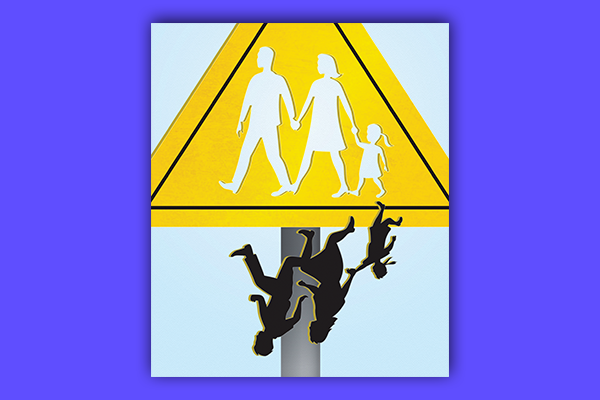HOW IS IT possible that a major Christian denomination has refused to aid refugees from South Africa? Isn’t “welcoming the stranger” critical to a Christ-like response?
The problem here isn’t people leaving the country to make a fresh start.
In May this year, the Episcopal Church refused to provide support and assistance to more than 50 white South Africans arriving in the United States to claim refugee status. The denomination took this action in consultation with and the support and endorsement of Rev. Thabo Makgoba, the Anglican archbishop of Cape Town, South Africa.
Despite the Episcopal Church’s nearly 40-year commitment to “seek and serve Christ in migrants and refugees,” it declared an end to its refugee resettlement contracts with the federal government because of Trump’s “white refugee” charade. To understand why the church’s refusal to resettle this group of white South Africans is not antithetical to the gospel, we need to take a closer look at the history of apartheid or racial segregation in my country.
From 1948 to 1994, South Africa was governed by a form of martial law. The legal, civic, and ecclesial systems collectively known as apartheid enriched white people and excluded Black people from land, jobs, education, health care, and everything else that would nurture God’s full abundance in their lives. These apartheid laws upheld a system of segregation enforced through fear and state-sanctioned violence. During this era, the Episcopal Church was part of a global coalition of churches that actively resisted this system, in solidarity with the Black majority of South Africans.
In September 1985, an ecumenical group of religious leaders published the Kairos Document, a prophetic call to action for Christians in South Africa. The writers called apartheid a sin, noting: “The South African apartheid State has a theology of its own and we have chosen to call it ‘State Theology’ ... the theological justification of the status quo with its racism, capitalism and totalitarianism. It blesses injustice, canonizes the will of the powerful and reduces the poor to passivity, obedience and apathy.”
Those initial leaders insisted that a faithful witness to the good news of Jesus required Christians to work toward the destruction of legalized and weaponized racial segregation. In 1991, after a long and bloody struggle, apartheid legislation was repealed in South Africa.
Nearly 35 years later, South Africa struggles with the social, economic, moral, and spiritual ramifications from that authoritarian political culture that ensured that our country was dominated by a minority white population. Recent World Bank data shows we have the most unequal country in the world — and not because the tables have turned along racial lines. Despite white people making up less than 10% of the population, we continue to own 72% of the land and hold 63% of all top employment positions. This inequality produces exceptionally high levels of violent crime that impact all vulnerable populations, regardless of race. However, because of the wealth disparity, Black South Africans are more impacted by this violence than other racial groups.
In February, U.S. President Donald Trump acted against South Africa. Rather than focusing on South Africa’s failure to address historic injustices or violent crime, the Trump administration issued an executive order that promotes verifiably false conspiracy theories about genocidal attacks on white South Africans and government land theft targeting white farmers.
The theory of “white genocide” was prevalent in Nazi Germany and has found new currency since the mid-1990s as a rallying cry of white nationalists seeking white minority control, including within South Africa. President Trump instructed his administration to “prioritize humanitarian relief, including admission and resettlement ... for Afrikaners” (as some white South Africans call themselves). It was on this basis that the first group of white “refugees” arrived in the United States.
What then do we make of the Episcopal Church refusing to support these white refugees? As a white South African Christian, I say that this is a brave, principled, and biblical stance against white supremacy. This group of white South Africans, like all of us, may have tragic experiences of violent crime, but they have fallen victim to a false narrative rooted in South Africa’s white supremacist ideologies. They are certainly not facing the kind of persecution that would grant them refugee status — a right that the Trump administration is revoking from so many others with darker skin tones.
The problem here isn’t people leaving the country to make a fresh start. The problem is that the status of “refugee” does not apply here and is inherently rooted in a narrative of white supremacy and victimhood. White people, and white farmers, are affected by South Africa’s alarmingly high crime and violence, but to claim that they are more affected, or systemically targeted, is exceptionalism that places more value on white lives than on others. The Episcopal Church’s actions are faithful to the gospel and boldly resist the anti-human spirit of apartheid raising its evil head across the globe.
In 1985, those Christians who wrote the original Kairos Document defined kairos as a time of crisis, but also as a “moment of grace and opportunity.” It is “the favorable time in which God issues a challenge to decisive action. It is a dangerous time because, if this opportunity is missed, and allowed to pass by, the loss for the Church, for the gospel and for all the people of South Africa will be immeasurable.”
Today, the actions of the Trump administration have created such a time of crisis. As a decisive response, a group of white Christian leaders in South Africa released a public statement challenging the false narrative from the White House. In it we unanimously and publicly rejected the claims made by the Trump administration about the experience of white people in South Africa. As white Christians we recalled our history where “the Christian faith was used to justify the oppressive colonial and apartheid regimes tacitly and explicitly.” We watch as U.S. political rhetoric also draws on Christian faith in ways that dismiss “the most basic Christian call to caring for the vulnerable, loving of neighbors, and working for a good society for all.” Such a distorted Christianity produces terrible violences. We utterly reject justifying such violences in the name of Christianity or God.
This statement from white South African Christian leaders and the refusal of the Episcopal Church to participate in a “white refugee” charade seek to catalyze Christians to be, as it was put in the Kairos Document, “prophetically relevant to everything that happens in the world.”
Real genocide is occurring today, livestreamed from Gaza. Wars and famine, magnified by climate collapse, daily impact the world’s most vulnerable people, such as in Sudan and Haiti. The crisis and opportunity of the moment is a call to all Christians, lay and ordained, to take up our “responsibility for acting and living out our Christian faith in these circumstances.”

Got something to say about what you're reading? We value your feedback!






